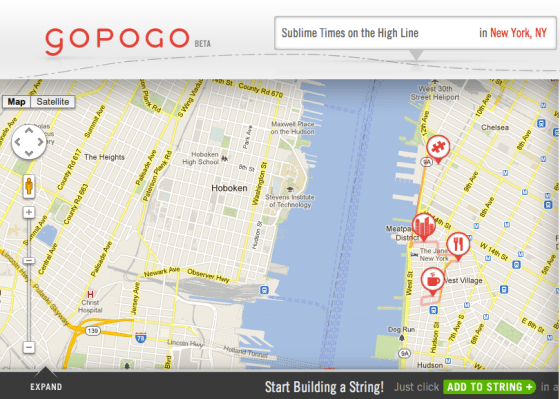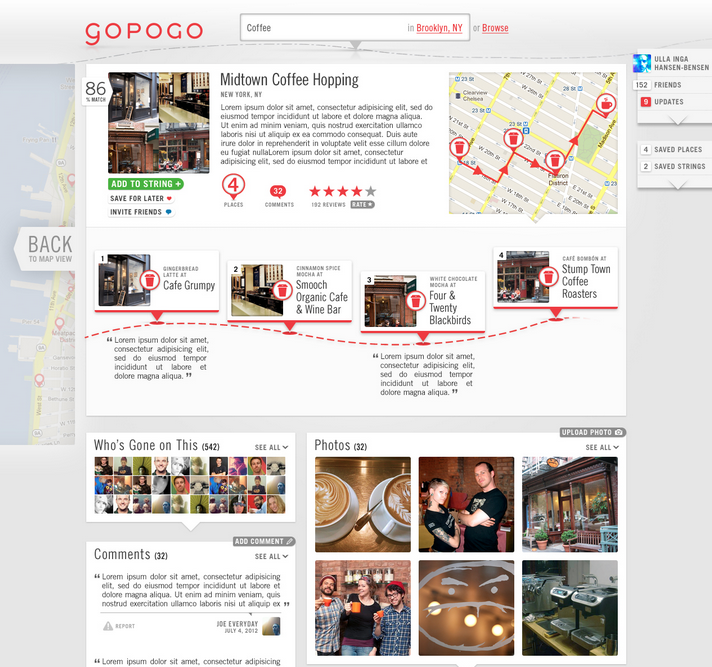With the rise of social networks, people are now sharing more information about themselves online than ever before. Sharing is happening at an unprecedented volume, with some calling it … “The Sharepocalypse”. Social feeds now disseminate content in realtime, but the problem of course is that a lot of this sharing gets lost in the noise — and with content piling up so quickly, stuff quickly gets lost. Want to find a tweet you wrote a year ago? Good luck.
A New York-based startup called Gopogo is launching in beta today to address this problem, with a geo-location platform for recording, sharing and discovering connected experiences. The startup launches with $3 million in seed funding from an undisclosed private equity group and has been testing its model with more than 10K people in both NYC and Los Angeles. Gopogo users create “Strings,” what the team describes as sharable social objects that consist of any group of places that have relevance and context for the user.
The startup is today launching its online platform, with an iOS app in the approval process, that lets users capture and record the activities and experiences of their day, linking them together in “Strings” to tell the story of their day, for example. Users might start off a weekend in New York City with a walk on the High Line, followed by some coffee at a cafe, before heading to art gallery. Strings unite those activities in a geo-tagged chronology, with photos, videos, and commentary included, and can then archive them and share on social networks as well as with the GoPoGo community.
At the end of the day, users can then browse the site’s library of user-generated Strings, and discover the experiences of others, by location, theme, or areas of interest. It’s a bit like a more dimensional Facebook Timeline, and reminiscent of what HipGeo is doing with social travel, or a location-based Piictu.
While there are plenty of apps that let users check in, write reviews, upload photos, and write realtime anecdotes, says Gopogo Founder and CTO Jason Snyder, they remain fragmented collections and communities of information, so the team wants Gopogo to be the platform that unites social media platforms, allowing users to record and save their experiences, and then share them across channels, as Strings publish as URLs.
Eventually, Gopogo wants users to be able to make their way to its website or mobile app, and connect their relevant Facebook, Twitter, Yelp, Instagram, and Foursquare accounts, so that they can upload content from their various streams and curate them into a String. Though, of course, the goal is to make this a two-way street, in which users can upload photos, write reviews, check-in all within Gopogo, and then push those updates into their various social streams. That will make Gopogo into a big time saver, and more of a social media command center that lets you turn your experiences into a complete story and context based on location.
The first stop for Gopogo is Foursquare integration, using their API to allow users to check-in to Foursquare from Gopogo. Bit.ly integration is also slated to be available soon, and Twitter, Yelp, and the rest will follow thereafter.
Gopogo is in beta right now, and the UX on the homepage is a little buggy, so keep that in mind as you test it out. The homepage definitely needs to do a better job showcasing noteworthy strings right off the bat, so new users have an opportunity to familiarize themselves with how they work, and what they look like. That being said, Gopogo’s Strings are a great concept. As the general web user gains more facility with social networks, and smart mobile applications produce more and more data, the demand for an easier way to contextualize and archive these mobile experiences will continue to grow.
In terms of how Gopogo plans to make money, the business model is still in flux, but the team sees the platform as a way for brands and content creators to better engage with their customers, build brand awareness, and drive traffic into their stores. The goal will be to let businesses create their own branded strings, so if you’re Frank’s Hot Sauce, you would create a String of restaurants, delis, etc that offer food that goes well with your hot sauce. Or users could gift strings to each other, and just show up at the locations, where the experience will already be pre-arranged for you.
For businesses, Gopogo would offer the opportunity to see where they fit into people’s Strings, which are public data once they’re published, so they can dive into this info to see how users connect with other businesses in their neighborhood.
The startup is also working with celebrities to publish their “perfect days,” so that, like Twitter, people of note can use the platform as a channel to leverage their influence and drive traffic to their brands or stores of choice. In turn, Gopogo is also hoping to offer a white-labeled version of its platform to allow ad agencies and the like to create fully-branded, custom versions of its service to create, promote, and manage special offers and events targeting their existing member base.
It still has a ways to go, but there are plenty of opportunities to monetize if Gopogo can get to that critical mass of users. With 10K beta testers, it’s certainly on the way.
For more, check out Gopogo at home here.

